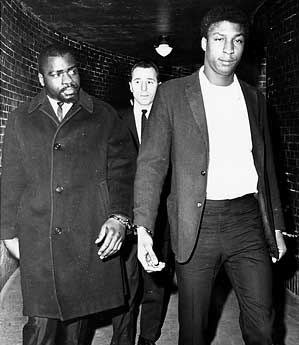
The eye of the ‘Hurricane’
His name isn’t mentioned in Bob Dylan’s song, “Hurricane,” but the song still tells his story. John Artis, the man falsely convicted with Rubin “Hurricane” Carter, told it again last night in the Hughes-Trigg Varsity, sponsored by Program Council’s Black Awareness Committee.
In 1966, Artis was a high school graduate, only months away from cashing in on his four-year scholarship and becoming the first in his family to attend college. He was an all-star athlete, a Boy Scout and sang in his church choir. He was also an African-American man driving a white car with Carter on the night that three people were killed by two other African-American men, also driving a white car.
Artis and Carter were arrested for the murder even after one of the victims had cleared them of their charge. The hope of his promising future seemed to be fading away.
“I’ve never had any practice being locked up,” Artis said. “Except being grounded, I didn’t know what to expect.”
With no evidence and only the testimony of a known criminal, the jury found him guilty on three accounts of homicide and one charge of assault and battery with intent to kill. Artis was sentenced to three concurrent life terms, but they also gave him a recommendation of mercy.
“Had they said without recommendation of mercy I wouldn’t be here right now – I would be dead,” Artis said. “Had it happened to me in Texas, I would be dead.”
Luckily he was not in Texas; he was in Patterson, New Jersey. And he did not let himself die. He says his faith, naiveté, youth and curiosity kept him alive. Instead of letting bitterness and anger get the best of him, Artis never lost sight of his dream, being the first in his family to go to college.
“My ultimate goal growing up was to be first one in my family to get a college degree,” he said. “I promised my mom that.”
He also followed advice from his father, his role model.
“My father always said ‘education is the sledgehammer for society’,” Artis said. “With education you can beat your way through life. I never lost sight of that.”
After negotiating himself down to a full-minimum prison, he further convinced officials to allow him to go to college. And in five years, Artis obtained a degree in business administration and management of personnel.
On Dec. 22, 1981, another dream came true for Artis. After 15 years in prison, he was freed on parole. And four years later, a federal judge dismissed all charges placed on Artis and Carter.
“I am blessed,” he said. “The only thing I ever wanted was a college education and my name cleared – I got both.”
Artis was in the wrong place at the wrong time and warns that what happened to him could happen to anybody.
“It doesn’t matter how much money you have, how much affluence you have, or where you are in life,” Artis said. “All it takes is an accusation.”
And now after the events of 9-11, people are really starting to look at each other. However, Artis warns against those who are still hung up on the complexion of someone’s face.
“It doesn’t matter,” he said. “White, black, red, pink or Technicolor – we have a mutual enemy. Right now white people have to get my back and I have to get white people’s back”
Artis sees the world differently now. He does not take anything for granted. He realizes some things are important and some things are not.
“The one thing you take for granted is your freedom,” he said. “You don’t realize what it means until you’ve lost it. I am fortunate. I fought my battles and I won my war.”








